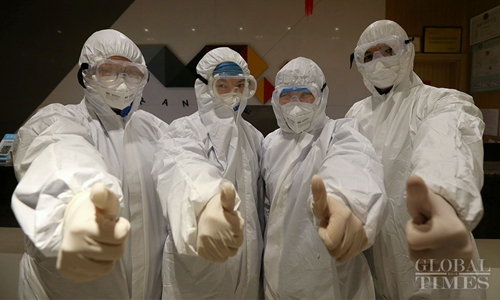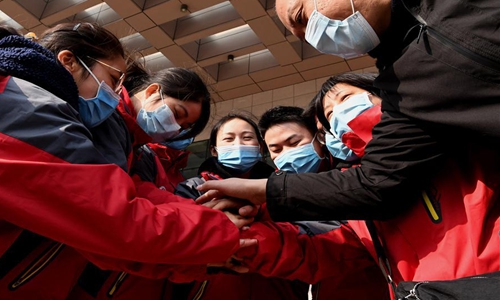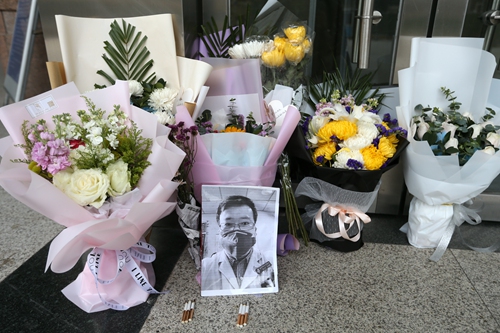HOME >> CHINA,SPECIAL-COVERAGE
Outbreak may peak in mid or late-February: epidemiologist
By Chen Qingqing and Zhao Yusha Source:Global Times Published: 2020/2/11 21:23:40
Top leader stresses Wuhan win vital to national virus fight

Medical personnel at a centralized isolation point in Wuhan express confidence in winning this relentless battle against the novel coronavirus. Photo: Cui Meng/GT
China vows to win the battle against the coronavirus while the epicenter of the disease has now entered a critical stage amid this people's war against the epidemic, forcing local authorities to deal with a management crisis and respond to public discontent discontent more efficiently.
Although new confirmed cases of novel coronavirus pneumonia (NCP) outside Central China's Hubei Province, where the highly contagious virus originated, has been dropping for seven consecutive days, as showed by the official data, the situation in Wuhan, the capital city of the province, remains a core challenge.
During a video call with medical care personnel in Wuhan on Monday, Xi Jinping, general secretary of the Communist Party of China Central Committee, said epidemic prevention and control work is at a critical stage and we must persist and resolutely win the defensive battle in Wuhan and Hubei, which will also guarantee a national victory against the virus, according to Xinhua News Agency.
Total confirmed cases nationwide reached 42,725 as of Tuesday with the death toll hitting 1,017, and suspected cases reaching 21,675. The epidemic-stricken Hubei saw confirmed cases rise to 31,728 with 974 deaths.
The epidemic situation outside Hubei has shown downward trends, as other provincial-level regions have recorded decreasing numbers of new confirmed cases for the seventh consecutive day, He Qinghua, an official from the National Health Commission (NHC), said at a press briefing on Tuesday.
However, analysts advise that people should not be too optimistic as the turning point has not emerged yet given the mass migration during the return travel rush. And the most challenging battleground is still in Wuhan.
While some experts suggested that continuous decreasing numbers of confirmed cases show that the inflection point outside Hubei is expected to arrive in about 10 days, Zhong Nanshan, China's top epidemiologist, told the Global Times via a video call interview on Tuesday that the inflection point of the outbreak cannot be predicted now. "It may peak in mid or late-February," he said.
Facing dire circumstances, the whole country has stepped up efforts in supporting Wuhan and Hubei in fighting the battle.

Medical workers cheer for each other before setting off for Wuhan in Hubei Province, in Zhengzhou, central China's Henan Province, Feb. 2, 2020. The second batch of 122 medical workers from Henan set off on Sunday to aid the coronavirus control efforts in Wuhan. (Xinhua/Li An)
All-out efforts
As of Sunday, 165 medical teams in total from 29 provinces and municipalities including three teams from military hospitals arrived in the province to join the battle, discontentinvolving 19,916 personnel, according to media reports. Of them, 152 teams with 18,226 medical staff have been dispatched to all designated hospitals in Wuhan to treat patients infected with the coronavirus, while the other 13 teams have been arranged to serve hospitals in prefecture-level cities like Huanggang, Xiaogan and Ezhou.
Local authorities in Wuhan have also launched citywide carpet screenings on suspected cases and the city's Party secretary Ma Guoqiang vowed to test all suspected cases of the NCP by Tuesday. Meanwhile, as part of enhanced measures in fighting against the virus, local authorities have set up checkpoints in residential areas to cut contagious channels starting from Tuesday, and Global Times reporters saw medical staff in protective suits standing at those checkpoints.
"We have arranged 1,930 beds and all the medical staff available for work are now at the frontline, it's indeed the final battle," Cheng Cai, a veteran doctor at Wuhan's Tongji Hospital, told the Global Times on Tuesday.
However, hospitals in Wuhan are still facing shortages of supplies, and many medical personnel have been overworked, in addition to the fact that the characteristics of this virus remain unknown, "these are the major challenges for us," Cheng said.
Major hospitals at the epicenter still face supply shortages due to a grim situation and heavy workloads, and hospitals such as Jinyintan and Central Hospital asked for public donations including supplies like N95 masks, protective suits and protective goggles, the Hubei Health Commission said in a post published on Tuesday.

A photo of Li Wenliang is among the flowers people sent to the Central Hospital of Wuhan on Saturday. Photo: Cui Meng/GT
Public discontent
Incompetence and slow response to the crisis at the early stage of the outbreak has put local authorities of Wuhan and Hubei under spotlight while the public urged that those officials who failed to raise the alarm in the first place and fulfill their duties should be held accountable for the people who have been suffering, some of whom lost their loved ones.
Zhang Jin, Party secretary of the Hubei Provincial Health Committee, and Liu Yingzi, director of the committee, were both removed from office, China Central Television reported on Tuesday. Wang Hesheng, a veteran health official whose last post was in the NHC, is now assigned to take the two posts. Wang is also one of the members of the central government group assigned to take charge of epidemic control work.
Wang Hongwei, a professor at the Renmin University School of Public Administration and Policy, told the Global Times that sacking two senior officials from the Hubei health commission is a response to public sentiment, which was fermenting after their once-a-year Spring Festival holidays were ruined and ordinary people's lives disrupted by the viral outbreak. "They believe someone should be held responsible and take the blame."
Some online voices went further to demand more Hubei officials be punished for "their misjudgment and poor performance," but Wang slammed such a suggestion as an "irrational request."
He agreed the Hubei government, although informing the virus, failed to respond in a timely manner. Other slacking of duty, such as unaware of the quantity of medical resources at the press conference, deserve indignation. But the central government already sent investigation teams to probe into this matter, decisions regarding the appointment and dismissal of officials should be based on results of their investigations, said Wang.
The most pressing task now is not to claim credit or level accusations on certain officials, it's the fight against the virus. The majority of officials working on the frontline of viral prevention needed more support from the public, not finger pointing, according to analysts.
Enhanced measures taken by local authorities showed some progress, reflecting by the latest data. Mi Feng, spokesperson of NHC, said in a press conference on Tuesday afternoon that the number of newly reported suspected cases reached a peak on February 5 with 2,071 and dropped to 961 on Monday, showing that Wuhan has been pushing forward steadily in the campaign of rounding up all patients and suspected patients for collective treatment.
Ma Guoqiang, the Party Secretary of Wuhan, told a press conference on Monday night that 99 percent of local population has been screened, sparking online discontent as netizens continue publishing SOS posts on the Chinese Twitter-like Weibo in recent days, yearning for help and public attention regarding their family members who could not receive proper treatment.
Also, some online rumors, with the aim of tarnishing the reputation of the public administration in Wuhan city, continue circulating, claiming that medical supplies brought by aid teams from Shanghai have been stolen. .
The government of Wuhan and Hubei Province seemed to be panicked after the outbreak, they rushed into making serious enforcement measures all at once, Liu Yuanju, a research fellow at the Shanghai Institute of Finance and Law, told the Global Times.
"At a crucial time like this, the public can be easily panicked; but officials are here to calm them down and come up with effective countermeasures," Liu noted.
As more people are treating the virus with a more rational attitude after they saw the accumulated data collected in recent days showing fatality rates of the virus are relatively low, we are at another stage of fighting the virus, both the public and the Hubei government should treat it with more rationality and practicability, he added.
Posted in: SOCIETY,FOCUS